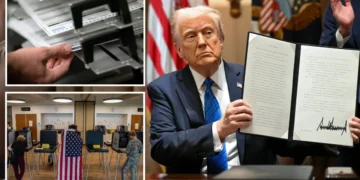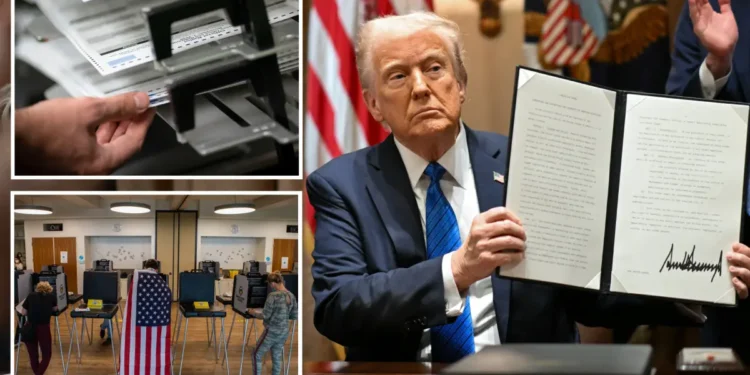Former President Donald Trump has announced a major overhaul of the U.S. election system through an executive order, citing India’s voter ID system as a model for ensuring election integrity. The order mandates that all voters provide proof of U.S. citizenship before being allowed to cast their ballots, a move that is expected to ignite fierce debate across the political spectrum.
The order, signed at a rally-style event, marks one of the most significant changes to election laws in modern American history. Trump, who has long claimed that voter fraud played a role in past elections, pointed to India’s system, where over 900 million eligible voters use a national voter ID card, as an example of what he believes the U.S. should emulate.
“India, the largest democracy in the world, has a strict voter ID system, and it works incredibly well,” Trump stated. “If they can do it, why can’t we? This order ensures only American citizens decide American elections.”
The order lays out several key provisions aimed at tightening voter verification. All voters must present valid documentation, such as a passport, birth certificate, or naturalization papers, when registering and before casting a ballot. Federal agencies will be tasked with cross-referencing voter rolls to remove ineligible voters. The order places new restrictions on mail-in ballots, including requiring a photocopy of proof of citizenship with ballot submissions. States that fail to enforce these measures risk losing federal election funding.
Democrats and civil rights groups have already signaled strong opposition, arguing that the order could lead to voter suppression, particularly among marginalized communities who may struggle to obtain the necessary documents. Senate Majority Leader Chuck Schumer called it “a blatant attempt to disenfranchise millions of eligible voters,” adding that efforts should be made to expand access rather than restrict it.Trump
Legal challenges are expected to follow swiftly, with critics questioning the federal government’s authority to impose these changes on state-run elections. The American Civil Liberties Union (ACLU) has vowed to challenge the order in court, citing concerns that it violates the Voting Rights Act.
Table of Contents
On the other hand, Republican lawmakers and conservative groups have largely praised the move, framing it as a necessary step to restore faith in elections. House Speaker Mike Johnson said, “Election security is paramount, and ensuring only legal votes are cast is common sense.”Trump
Despite the executive order, implementing these sweeping changes nationwide presents significant logistical and legal hurdles. The U.S. has no national voter ID system, and states have traditionally controlled their own election processes. Some states with Democratic leadership have already signaled that they will resist enforcing the new requirements.
Questions remain about how the government will assist citizens in obtaining the necessary documents and whether there will be exceptions for those unable to provide proof immediately.
As legal battles begin to unfold, the fate of Trump’s election overhaul remains uncertain. If upheld, the order could reshape how Americans vote for generations, bringing the U.S. closer to election systems seen in countries like India. However, if struck down, it could reignite debates over voter ID laws and federal authority in elections. Both parties are gearing up for what is expected to be a fierce political and legal fight over the future of U.S. election security.
Also Read : HAL Share Price Rises as GE Aerospace Delivers First of 99 F404-IN20 Engines















 Categories
Categories









